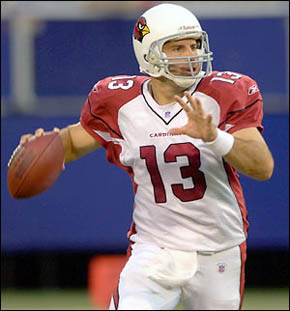Football Gives Quarterbacks More Than a Headache

Playing football gave two NFL quarterbacks more than a headache yesterday- it gave them concussions. Arizona Cardinal’s Quarterback Kurt Warner left the game in the second quarter after being hit from behind by Rams safety Oshiomogho Atogwe. He appeared shaken but stayed in the game for five more plays. As Warner put it: “It was one of those situations where I didn’t feel perfect, so I just wanted to be cautious with it. I actually feel pretty good right now. Just a very, very slight headache. I remember everything that happened. I didn’t get knocked out.”
Meanwhile, Pittsburgh Steeler’s QB Ben Roethlisberger, who faced Warner this year in the Super Bowl, was also injured by taking a knee to the head while being sacked during the Steeler’s game against the Kansas City Chiefs. Roethlisberger left the game right afterward, which was in overtime. This is apparently the fourth concussion of his NFL career. According to Pittsburgh coach Mike Tomlin, “It was a concussion-oriented thing, so I doubt he was going to come back into the football game. I don’t have a lot of information in terms of where he is or his level of availability.”
What is a concussion?
The brain normally floats inside the skull, surrounded by spinal fluid. The brain has a consistency somewhat like jello, and although somewhat protected by the skull, is not completely protected by the impact of a violent force. Rapid changes in head movement, such a significant blow to the head, can cause the brain to hit against the inner wall of the skull, causing injury to the delicate brain tissue. There is also a chance that blood vessels in the brain can be torn, leading to bleeding in or around the brain.
Concussion is a very common problem, with over 1 million concussions occurring in the US each year. Many occur as sports injuries. Symptoms can range from mild to severe. They can include headache, loss of consciousness, and memory loss (amnesia)of events surrounding the injury. Many concussions do not involve loss of consciousness, but victims may appear shocked or stunned or a short period of time.
Symptoms of a more serious head injury include:
* Changed level of alertness (drowsy, hard to arouse, or similar changes)
* Seizures (convulsions)
* Muscle weakness on one or both sides
* Continued confusion
* Persistent unconsciousness (coma)
* Repeated vomiting
* Unequal pupils
* Unusual eye movements
* Walking problems
* Ear ringing
* Impaired balance
The presence of these symptoms requires evaluation by a physician. For mild concussions, treatment is rest, mild analgesics, and observation.
For more information:
| Resounding Health(TM) Concussion |



























0 comments